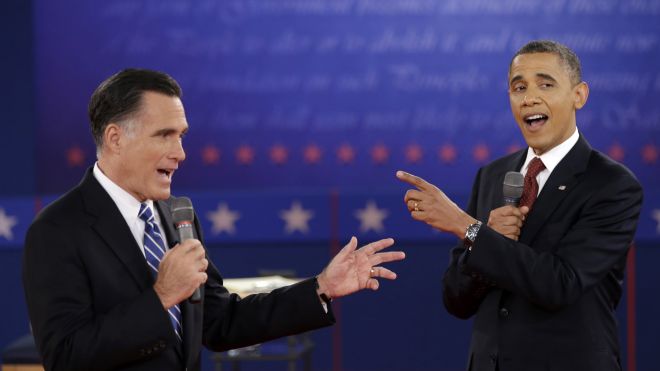
Published October 22, 2012
FoxNews.com
WASHINGTON – President Obama and Mitt Romney were spending the final hours before their third and final debate — a potentially decisive bout that will focus on foreign policy — studying hard, as new polling reinforces the view that Romney’s surge out of their first debate has made the race too close to call.
With two weeks until Election Day, neither candidate is likely to get another chance after Monday night to articulate his platform to such a broad audience. The debate offers the usual mix of opportunity and peril for the candidates. One slip-up could drive coverage for days, with precious few left on the calendar. A strong performance by either could turn a post-debate bounce into an Election Day victory.
And the race is tight enough for any needle-moving out of Monday night’s debate to make a difference. An NBC News/Wall Street Journal poll on Sunday showed the president and Romney tied at 47 percent. A new Politico/George Washington University Battleground tracking poll showed Romney leading 49-47 percent — marking the first time the Republican nominee has led since May.
The 90-minute faceoff at Lynn University in Boca Raton, Fla., offers the candidates their last opportunity to stand one-on-one before tens of millions of Americans and command their undivided attention before next month’s election. Both candidates largely dropped out of sight and devoted their weekends to debate preparations, a sure sign of the high importance they attach to the event.
The debate is likely to get testy. In the last round, the two candidates repeatedly interrupted each other, and the moderator, as they jostled for time. The sensitive subject of the Libya terror attack is also expected to be a top issue Monday night.
While the principals warm up for their evening debate in the battleground state of Florida, their running mates will be busy Monday seeking votes in two of the eight other states whose up-for-grabs electoral votes will determine the next president — Vice President Joe Biden in Ohio and Republican Rep. Paul Ryan in Colorado. Also still hotly contested: Iowa, New Hampshire, Nevada, North Carolina, Wisconsin and Virginia.
It fell to campaign surrogates on Sunday talk shows to frame the foreign policy matters that moderator Bob Schieffer will put before the candidates in a discussion sure to reflect “how dangerous the world is in which we live,” as the CBS newsman put it. Iran’s nuclear intentions, the bloody crackdown in Syria, economic angst in Europe, security concerns in Afghanistan, China’s growing power — all that and more are on the agenda.
And all feed into the broader debate over which candidate offers the steady hand and sound judgment for a nation facing myriad challenges at home and abroad.
Florida Sen. Marco Rubio, arguing for the Republicans, faulted Obama for “his failure to outline broad goals, real goals, a real view of what America’s role in the world should be.” Romney, by contrast, would “use America’s role in the world as a catalyst for peace, prosperity and freedom,” he said.
Ryan, campaigning in Colorado Springs, Colo., on Sunday, faulted the president for potential defense cuts and said that when adversaries “see us projecting weakness, when they see us hollowing out our military … they think we are a superpower in decline.” It was a likely preview of one of Romney’s arguments in the debate.
Obama adviser David Axelrod said that when the president took office “we were isolated in our position on Iran and in the world. And today, the world is unified against Iran with us, all because of the leadership of this president.”
The Obama campaign released a blistering memo from Senate Foreign Relations Committee Chairman John Kerry, D-Mass., accusing Romney of offering nothing but “endless bluster” on international issues.
“He is an extreme and expedient candidate who lacks the judgment and vision so vital for the Oval Office,” said Kerry, who is considered a leading candidate to succeed Hillary Rodham Clinton as secretary of state if Obama wins a second term.
When it comes to their foreign policy credentials, both candidates have reasons for optimism and concern: While foreign policy has been a strength of Obama throughout the campaign, some recent polls show his advantage narrowing. The Pew Research Center’s October poll, for example, found that 47 percent of Americans favored Obama to make “wise decisions about foreign policy,” while 43 percent preferred Romney.
The Associated Press contributed to this report.
